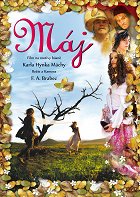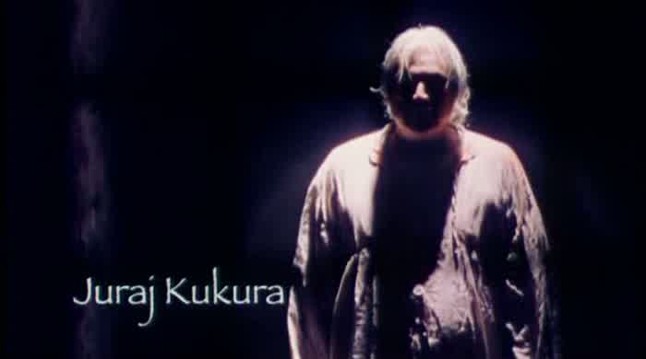Regie:
F. A. BrabecKamera:
F. A. BrabecBesetzung:
Matěj Stropnický, Sandra Lehnertová, Juraj Kukura, Bronislav Poloczek, Vladimír Javorský, Nina Divíšková, Jan Přeučil, Kryštof Hádek, Jan Tříska (mehr)Inhalte(1)
An imagery poem in the true sense of the word? Yes! Because this film can only be approached in a single way – using the power of imagery to match the power of the words. Yet we shall not describe with words what a camera can tell via pictures and a film with a story. We shall not repeat notorious facts but even those not familiar with May will clearly see the story is one of love and boundless desire. The story takes place in an unspecified, distant past. But in spite of this unspecific and not very remote “distant past”, the young heroes are more or less contemporary characters. Emotion is a motion, a direction we want to take using all means of expression, in particular imagery. Setting out in this direction, we shall encounter images of my dreams rather than images of my life, hoping that dreams will allow us to transpose the time-tested poem, more than a century old, into a stirring story of undying love and passion… (Verleiher-Text)
(mehr)Kritiken (7)
Die entleerten Manieren eines Gemäldes, oberflächliches Geschwätz über Metaphysik, eine PR-Kampagne für den kultigen mittelböhmischen See namens Mácháč, ein wunderschöner Vortrag von Versen durch den bekannten tschechischen Schauspieler Jan Tříska. Die Besetzung ist, mit Ausnahme von Jan Tříska gewissermaßen ein Fehltritt, teils auch eine traurige Situation, wo es daran hapert, mit überhaupt jemandem, über überhaupt etwas zu sagen, und jeder in sich verschlossen bleibt. Es überrascht mich überhaupt nicht, dass der tschechische Regisseur F.A. Brabec trotz aller herumflatternden Fetzen und Kreuze entlang der Straßen nicht über eine banale Liebesstory hinausgegangen ist. Ein Stern der Rezitation wegen und ja auch wegen der sich ständig entblößenden weiblichen Hauptheldin.
()
The same applies to the original poem as to its adaptation (yes, Máj represents everything that I hate the most about romanticism). Lehnertová can’t act; luckily she’s silent and undressed most of the time. Stropnický’s terrible lord of the forest is truly terrible. Sixty-two-year-old Kukura is unable to say a single line in a way that it sounds at least a little natural; he knows this and so decides to bury his head in the “sand" for shame (note: the sand is in fact the lap of a girl who could have been his granddaughter). Tříska’s antagonistic expression doesn’t help, but luckily his oratory skills save the day. I simply refuse to comment on the frightful idea with the soundtrack by Support Lesbiens, on the absolute incongruity of the series of shots, on the dream sequences and the “camerawork" - my nerves are in shreds from it.
()
Hynek! Vilém! Jarmila! The music was the best thing about the whole movie. The visual cues could have been better (What's the matter Brabec, are you selling yourself short? Or was this an attempt at "pure art" or something? :) ) But no, it worked, but he should have relied more on Mách, on his verses, that was the driver of all of May. Vilém unconvincing, Jarmila a bimbo who commits suicide all the way at the end (!); why not at the beginning? Anyway, as was already said: "Mr. Director, next time rely more on the subject matter! BUT I commend you for Tříska: it's a good thing he was there, his ‘dead mistress sensibility’ made my day better right away." :-) Hm, but I still would have done it completely differently.
()
The visually captivating concept of Mácha's novel "May," which stands and falls with the perfect balance of colors and moods, becomes a worthy continuation of the hitherto solitary tradition of the adaptation of Erben's novel "A Bouquet" after eight years. Together with the emphasis on the beauty of the landscape, Pecharová's romantic costumes, and Jarmila's physical curves, the film May becomes a visual treat. In terms of the acting, this delight is only supported by the acting aces Kukura, Javorský, and Tříska, while the younger generation is unfortunately made up of one debuting actor after another. This can be summed up as part of an experiment, but one that was much better at incorporating a purely modern musical arrangement.
()
Siebzig langweilige Minuten = siebzig Minuten von Brabec’ visueller Onanie, von der er offensichtlich so hingerissen war, dass ihm alles andere egal war. Bedanken kann man sich nicht einmal für die Anwesenheit von (sonst) guten Schauspielern wie Tříska, Javorský oder Přeučil. Dieses dumme Werk konnten sie nicht mehr retten (und ich habe das Gefühl, dass sie es gar nicht versucht haben). Jetzt zu den Hauptrollen: Der "lächerliche Herr der Wälder" von Stropnický ist eine unglaublich schleimige und ekelige Figur. Jarmila (Sandra Lehnertová) wird als erstklassige… ähm… Prostituierte (Hure ist ein starkes Wort, das verstehen Sie ja bestimmt) dargestellt. Und Kukuras Schifner – schade um jedes Wort, um jeden Vokal und Konsonanten. Der Höhepunkt dieses Werkes war die Musik von der Band Support Lesbiens – eine beispiellos störende Pseudorockbegleitung und ein unglaublich doofes Abschlusslied. Ich darf auch nicht die Räuber vergessen, die wahrscheinlich seit dem Kindesalter "guten Stoff" rauchen. All diese Besonderheiten bestätigen, dass Der Blumenstrauss eine Ausnahme war. Vor jedem weiteren Film von Brabec sollte man Angst haben. Wirklich.
()
Es gibt literarische Werke, die sich nicht auf die Leinwand adaptieren lassen. Aber es gibt immer einen selbstbewussten Schöpfer, der denkt, er könne es schaffen. Was soll man noch sagen, es ist peinlich - Karel Hynek Mácha dreht sich sicherlich im Grab um.
()
Den Film Máj von der Handlung her zu beurteilen ist für mich völlig überflüssig, also versuche ich es gar nicht erst. Für mich ist diese Filmadaption eine Abfolge poetischer Bilder, die ein reizendes Ensemble bilden. Die Stimme von Jan Tříska als Erzähler ist ausreichend eindringlich, noch eindringlicher wären wohl nur noch die Stimmen der Herren Švehlík oder Lukavský. F. A. Brabec verdient zumindest für seinen Mut Respekt. Warum haben sich die übrigen angesehenen Regisseure nicht an so etwas gewagt? Weil sie es nicht besser gedreht hätten. Und vor allem, es lebe Matěj Stropnický, einmal wird er den pseudoanständigen Schleimer Bursík vom Thron stoßen!
()

